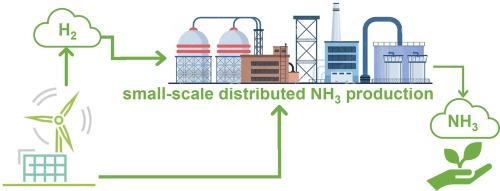吸收增强的Haber-Bosch用于小规模绿色NH3生产。可行性研究
IF 10.9
1区 工程技术
Q1 ENERGY & FUELS
引用次数: 0
摘要
在能源转型的背景下,氨(NH3),传统上用作肥料,由于其高氢密度(约17.8 wt%),代表了一种有前途的无碳能源载体。然而,NH3合成的巨大碳强度要求加强传统的、基于化石燃料的Haber-Bosch工艺。灵活、小型工厂、模块化和温和的操作压力成为可持续生产NH3的基本要求,NH3是由水电解器产生的绿色H2获得的。为了实现这些目标,本工作提出了强化Haber-Bosch过程的可行性研究,由Aspen Plus®V14仿真软件执行。降低操作压力,反应器下游的NH3冷凝被水中的NH3吸收所取代。采用基于夹紧技术和NH3等效法的能量分析方法对新型布局的性能进行了评价。由于比传统方案更低的电力需求和不需要热能,所提出的配置被证明是实现可持续和分散氨的有希望的途径,支持全球向低碳未来过渡的努力。本文章由计算机程序翻译,如有差异,请以英文原文为准。

Absorption-enhanced Haber-Bosch for small-scale green NH3 production. A feasibility study
In the context of energy transition, ammonia (NH3), traditionally used as a fertilizer, represents a promising carbon-free energy vector due to its high hydrogen density (around 17.8 wt%). Nevertheless, the huge carbon intensity of NH3 synthesis calls for an intensification of the conventional, fossil fuel-based Haber-Bosch process. Flexibility, small-scale plants, modularity and mild operating pressures become fundamental requirements for sustainable NH3 production, obtained by green H2 from water electrolysers. To achieve these objectives, this work presents a feasibility study for intensifying the Haber-Bosch process, performed by Aspen Plus® V14 simulation software. Lowering the operating pressure, the NH3 condensation downstream the reactor is replaced by NH3 absorption in water. Performances of the novel layout are assessed by means of an energy analysis, based on pinch technology and NH3 equivalent method. Due to the lower power requirement than the traditional scheme and the absence of thermal energy requirement, the proposed configuration is proved to be a promising pathway towards sustainable and decentralized ammonia, supporting global efforts for transition to a low-carbon future.
求助全文
通过发布文献求助,成功后即可免费获取论文全文。
去求助
来源期刊

Energy Conversion and Management
工程技术-力学
CiteScore
19.00
自引率
11.50%
发文量
1304
审稿时长
17 days
期刊介绍:
The journal Energy Conversion and Management provides a forum for publishing original contributions and comprehensive technical review articles of interdisciplinary and original research on all important energy topics.
The topics considered include energy generation, utilization, conversion, storage, transmission, conservation, management and sustainability. These topics typically involve various types of energy such as mechanical, thermal, nuclear, chemical, electromagnetic, magnetic and electric. These energy types cover all known energy resources, including renewable resources (e.g., solar, bio, hydro, wind, geothermal and ocean energy), fossil fuels and nuclear resources.
 求助内容:
求助内容: 应助结果提醒方式:
应助结果提醒方式:


